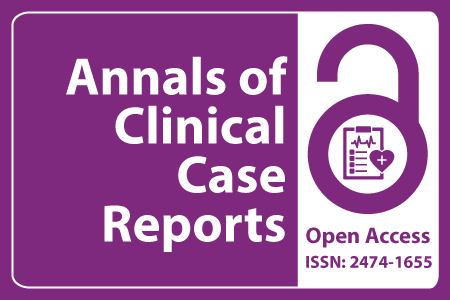
Journal Basic Info
- Impact Factor: 1.809**
- H-Index: 6
- ISSN: 2474-1655
- DOI: 10.25107/2474-1655
Major Scope
- Anesthesiology and Pain Medicine
- Family Medicine and Public Health
- Neurology
- Cardio-Thoracic Surgery
- Physical Medicine & Rehabilitation
- Lung Cancer
- Breast Neoplasms
- Psychiatry and Mental Health
Abstract
Citation: Ann Clin Case Rep. 2023;8(1):2467.DOI: 10.25107/2474-1655.2467
The outcome of Hematopoietic Stem Cell Transplant in a Patient Suffering from Congenital Dyserythropoietic Anemia Type II in India
Saptarshi AN1, Subramanian K2, More TA1, Dongerdiye R1, Kedar P1*
1Department of Haematogenetics, ICMR-National Institute of Immunohematology, King Edward Memorial (KEM) Hospital Campus, India
2Sahyadri Super Speciality Hospital, KEM Hospital Society, India
*Correspondance to: Prabhakar S Kedar
PDF Full Text Research Article | Open Access
Abstract:
Objectives: To study clinical, biochemical, and molecular details of the patient suffering from Congenital Dyserythropoietic Anemia type II (CDAII), treated with a hematopoietic stem cell transplant. Methods: The 5-year-old patient having severe transfusion-dependent anemia was diagnosed with Congenital Dyserythropoietic Anemia type II (CDAII) based on light microscopic observation of bone marrow aspirate, biochemical tests, and molecular tests using Sanger sequencing. He underwent a Hematopoietic Stem Cell Transplant (HSCT) to treat CDA II. His clinical, biochemical, molecular, and mRNA transcript levels are studied before and after HSCT to understand the effect of HSCT. Results: The patient had transfusion-dependent severe anemia, pallor, weakness, and icterus. A molecular study identified c.1385 A>G, p.Tyr462Cys homozygous mutation in the SEC23B gene causing CDAII. This is the most common type of congenital dyserythropoietic anemia. mRNA transcript levels of SEC23B gene were significantly decreased in this patient who received Hematopoietic Stem Cell Transplant from HLA-identical siblings. On follow-up at 18 months after HSCT, he did not require transfusion, other clinical features are normal and mRNA transcript levels are the same as that of healthy controls. Conclusion: This study highlights the outcome of hematopoietic stem cell transplant on clinical, biochemical, molecular, and SEC23B gene expression levels in a patient suffering from congenital dyserythropoietic anemia type II in India.
Keywords:
Congenital Dyserythropoietic Anemia (CDA); Hematopoietic Stem Cell Transplant; SEC23B gene expression; Iron overload
Cite the Article:
Saptarshi AN, Subramanian K, More TA, Dongerdiye R, Kedar P. The outcome of Hematopoietic Stem Cell Transplant in a Patient Suffering from Congenital Dyserythropoietic Anemia Type II in India. Ann Clin Case Rep. 2023; 8: 2467.













